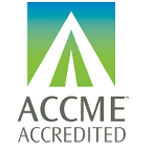Continuing Medical Education
Accreditation Statement

The American Association for Cancer Research (AACR) is accredited by the Accreditation Council for Continuing Medical Education (ACCME) to provide continuing medical education activities for physicians.
Credit Designation Statement
AACR has designated this live activity for a maximum of 18.50 AMA PRA Category 1 Credit(s)™. Physicians should only claim credit commensurate with the extent of their participation in the activity.
Credit certification for individual sessions may vary, dependent upon compliance with the ACCME Accreditation Criteria. The final number of credits may vary from the maximum number indicated above.
Claiming (CME) Credit
Physicians and other health care professionals seeking AMA PRA Category 1 Credit(s)TM for this live continuing medical education activity must complete the online CME Request for Credit Survey by March 13, 2025. Certificates will only be issued to those who complete the survey. Your CME certificate will be sent to you via email after the completion of the activity.

Successful completion of this CME activity, which includes participation in the evaluation component, enables the participant to earn up to 18.50 Medical Knowledge MOC points in the American Board of Internal Medicine’s (ABIM) Maintenance of Certification (MOC) program. Participants will earn MOC points equivalent to the amount of CME credits claimed for the activity. It is the CME activity provider’s responsibility to submit participant completion information to ACCME for the purpose of granting ABIM MOC credit.
To receive ABIM MOC, participants must request MOC in the CME Request for Credit Survey and complete all questions. Once these steps are completed, AACR will submit your completion information via the ACCME’s Program and Activity Reporting System for the purpose of granting MOC points.
Statement of Educational Need, Target Audience, and Learning Objectives
Radiotherapy is the standard of care for over 50% of cancer patients. Significant advances have occurred in the delivery of radiation therapy including substantial changes in dose and fractionation in the last decade. New methods like FLASH radiation and proton and carbon ion therapies are being implemented in the clinical setting. Moreover, advances in imaging technology have allowed for increased precision of radiation therapies clinically.
The need of the learners is to acquire knowledge on how different radiation modalities interact with systemic therapies to develop more effective combination treatments. This requires a deeper understanding of how emerging therapies can be integrated into clinical practice to optimize therapeutic efficacy and minimize side effects.
However, there is a critical gap in the understanding of the influence of these radiation technologies on signaling pathways, tumor microenvironment, metastases, and tumor biology. This gap exists because the development of new radiation therapies has largely progressed independently of advances in systemic treatments and vice versa. Consequently, there is limited understanding of how to optimally combine these therapies to enhance patient outcomes.
Advancing the understanding of radiation on systemic changes, tumor biology, and the immune system will allow for an optimal integration of systemic therapies to enhance patient outcomes. In addition, the sequencing of each therapy may have significant tumor control potential and unanticipated normal tissue toxicity. Leveraging research advances in these fields and bringing together researchers to discuss how best to combine these therapies will lead to improvements in the design of clinical studies to advance cancer therapy.
This conference will bring together leading physician scientists, researchers, and clinicians within the fields of radiation biology, cancer biology, targeted agents, and cancer immunologists together to discuss how various combination therapies may be optimized to enhance cancer therapy for patients.
After participating in this CME activity, physicians should be able to:
- Explain the rationale for integrating radiation therapy with targeted therapy.
- Assess the impact of various forms of radiotherapy on tumor biology.
- Evaluate and identify interactions between radiation therapy and the immune system.
- Establish dosing and timing for optimally combining radiation with other targeted therapies.
Disclosure Statement
It is the policy of the AACR that the information presented at AACR CME activities will be unbiased and based on scientific evidence. To help participants make judgments about the presence of bias, AACR will provide information that Scientific Program Committee members and speakers have disclosed all financial relationships they have with ineligible companies whose primary business is producing, marketing, selling, re-selling, or distributing healthcare products or services used by or on patients. All of the relevant financial relationships for these individuals have been mitigated
Planner and Speaker Financial Disclosure Index Available Soon
Acknowledgment of Financial or Other Support
This activity is supported by Professional Educational Grants which will be disclosed at the activity.
Questions about CME?
Please read our frequently asked questions. If you still have questions contact the Office of CME at (215) 440-9300 or [email protected].
